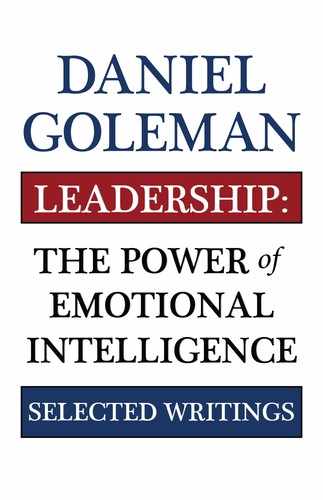THE PRIMAL DIMENSION
This emotional task of the leader is primal – that is, first – in two senses: It is both the original and the most important act of leadership. Leaders have always played a primordial emotional role. No doubt humankind’s original leaders – whether tribal chieftains or shamanesses – earned their place in large part because their leadership was emotionally compelling. Throughout history and in cultures everywhere, the leader in any human group has been the one to whom others look for assurance and clarity when facing uncertainty or threat, or when there’s a job to be done. The leader acts as the group’s emotional guide.
In the modern organization, this primordial emotional task – though by now largely invisible – remains foremost among the many jobs of leadership: driving the collective emotions in a positive direction and clearing the smog created by toxic emotions. This task applies to leadership everywhere, from the boardroom to the shop floor.
Quite simply, in any human group the leader has maximal power to sway everyone’s emotions. If people’s emotions are pushed toward the range of enthusiasm, performance can soar; if people are driven toward rancor and anxiety, they will be thrown off stride. This indicates another important aspect of primal leadership: Its effects extend beyond ensuring that a job is well done. Followers also look to a leader for supportive emotional connection – for empathy. All leadership includes this primal dimension, for better or for worse. When leaders drive emotions positively, as was the case with the second executive at the BBC, they bring out everyone’s best. We call this effect resonance. When they drive emotions negatively, as with the first executive, leaders spawn dissonance, undermining the emotional foundations that let people shine. Whether an organization withers or flourishes depends to a remarkable extent on the leaders’ effectiveness in this primal emotional dimension.
The key, of course, to making primal leadership work to everyone’s advantage lies in the leadership competencies of emotional intelligence: how leaders handle themselves and their relationships. Leaders who maximize the benefits of primal leadership drive the emotions of those they lead in the right direction.
How does all of this work? Studies of the brain reveal the neurological mechanisms of primal leadership and make clear just why emotional intelligence abilities are so crucial.
